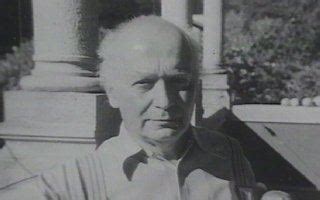A Quote by Theodore Roosevelt
Now and then we hear the wilder voices of the wilderness, from animals that in the hours of darkness do not fear the neighborhood of man: the coyotes wail like dismal ventriloquists, or the silence may be broken by the snorting and stamping of a deer.
Related Quotes
Many things that human words have upset are set at rest again by the
silence of animals. Animals move through the world like a caravan of
silence. A whole world, that of nature and that of animals, is filled
with silence. Nature and animals seem like protuberances of silence.
The silence of animals and the silence of nature would not be so great
and noble if it were merely a failure of language to materialize.
Silence has been entrusted to the animals and to nature as something
created for its own sake.
I now suspect that just as a deer herd lives in mortal fear of its wolves, so does a mountain live in mortal fear of its deer. And perhaps with better cause, for while a buck pulled down by wolves can be replaced in two or three years, a range pulled down by too many deer may fail of replacement in as many decades.
Wilderness is not only a haven for native plants and animals but it is also a refuge from society. Its a place to go to hear the wind and little else, see the stars and the galaxies, smell the pine trees, feel the cold water, touch the sky and the ground at the same time, listen to coyotes, eat the fresh snow, walk across the desert sands, and realize why its good to go outside of the city and the suburbs. Fortunately, there is wilderness just outside the limits of the cities and the suburbs in most of the United States, especially in the West.
The hush comes with the deepening of Autumn; but it comes gradually. Our ears are attuned to it, day by quieter day. But even now, if one awakens in the deep darkness of the small hours, one can hear it, a foretaste of Winter silence. It’s a little painful now, and a little lonely because it is so strange.
I now understand what Nelle Morton meant when she said that one of the great tasks in our time is to "hear people to speech." Behind their fearful silence, our students want to find their voices, speak their voices, have their voices heard. A good teacher is one who can listen to those voices even before they are spoken-so that someday they can speak with truth and confidence.
Then they grow away from the earth then they grow away from the sun then they grow away from the plants and the animals. They see no life. When they look they see only objects. The world is a dead thing for them the trees and the rivers are not alive. the mountains and stones are not alive. The deer and bear are objects. They see no life. They fear. They fear the world. They destroy what they fear. They fear themselves.
I realized that Eastern thought had somewhat more compassion for all living things. Man was a form of life that in another reincarnation might possibly be a horsefly or a bird of paradise or a deer. So a man of such a faith, looking at animals, might be looking at old friends or ancestors. In the East the wilderness has no evil connotation; it is thought of as an expression of the unity and harmony of the universe.
It's in the silence that I'm most able to hear the tiny voices that tell me I'm not good enough, smart enough, or cool enough. I try to hear them for what they are: my own creations. Sitting with them, letting them speak, hearing them out, and giving them back the silence that I'm now sitting in has shown me that, quite often, they shut up.
A bear and a deer are both wild animals. We allow the deer to roam in our backyard but we do not give the same right to the bear. It is because the bear is dangerous. Neither the bear nor the deer have rights. We humans give them rights. Taking in account our own security, we give to some animals some rights and deny the same to other animals.
The intelligence displayed by many dumb animals approaches so closely to human intelligence that it is a mystery. The animals see and hear and love and fear and suffer. They use their organs far more faithfully than many human beings use theirs. They manifest sympathy and tenderness toward their companions in suffering. Many animals show an affection for those who have charge of them, far superior to the affection shown by some of the human race. They form attachments for man which are not broken without great suffering to them.
It is raining and you can hear the pattern of the drops. You can hear it with your ears, or you can hear it out of that deep silence. If you hear it with complete silence of the mind, then the beauty of it is such that cannot be put into words or onto canvas, because that beauty is something beyond self-expression .
I think right now is when we need to hear different voices coming out of all parts of the world. You can't just hear the politicians and the military leaders. You have to hear from the taxi drivers. You have to hear from the painters. You have to hear from the poets. You have to hear from the school teachers and the filmmakers and musicians.


































